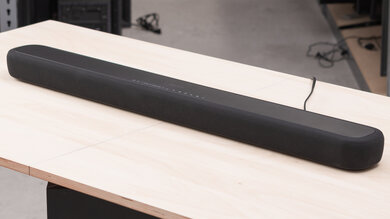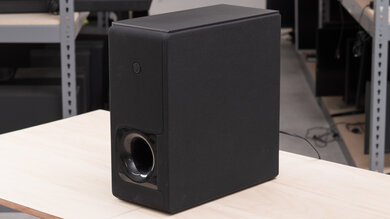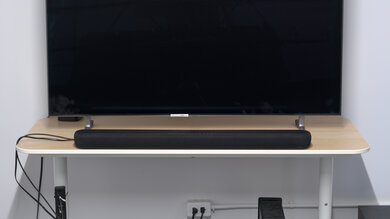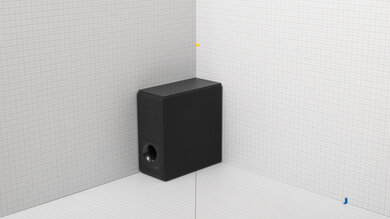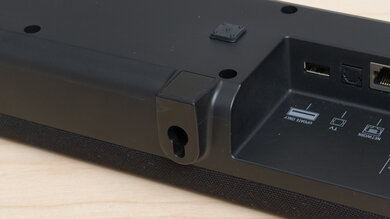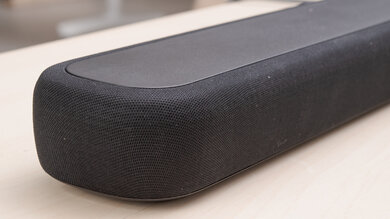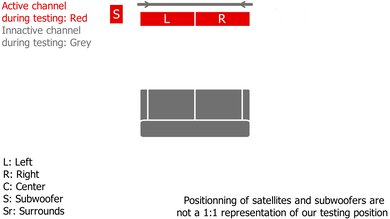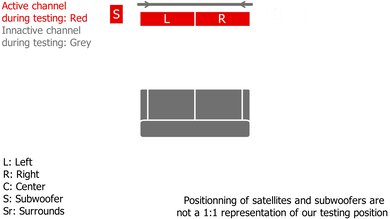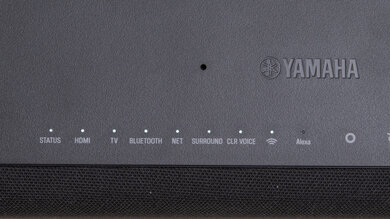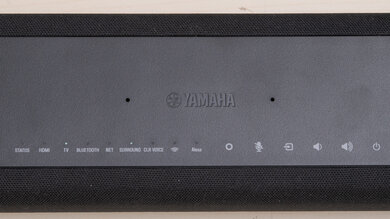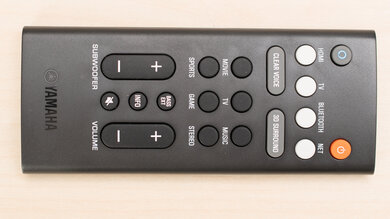The Yamaha YAS-209 is an entry-level soundbar with a 2.1 setup. Overall, it's a decent soundbar with a well-balanced sound profile. The subwoofer helps create good bass, so the soundbar's good for many different uses. The soundbar has two channels, left and right, so without any dedicated satellites speakers, it can't properly project surround sound. However, there's a virtual surround sound setting, which may help it with this problem. It has a built-in Alexa feature and the controls are fairly easy to use. It's a slight improvement over the Yamaha YAS-207, with a sleeker design.
Our Verdict
The Yamaha YAS-209 is a decent soundbar with a well-balanced sound profile. It has a great frequency response, and the subwoofer helps produce good bass. The soundbar won't offer an immersive listening experience because of its lack of surround sound and height channels. Alexa users will be happy with a built-in Alexa feature. In addition, the soundbar has a simple, sleek design that won't stand out with most TV setups.
-
Well-balanced sound profile.
-
Decent build quality.
-
Very good stereo performance.
-
Poor surround performance.
The Yamaha YAS-209 is good for dialogue. As a 2.1 system, the soundbar is able to reproduce voices and dialogue well, and has a dialogue enhancement feature to enhance clarity. Unfortunately the soundbar doesn't get very loud, but most TV shows won't need max volume.
Decent for music. The Yamaha YAS-209 has a well-balanced sound profile, and the dedicated subwoofer produces a good low-frequency extension, which is good for bass-heavy music. The stereo soundstage is alright, but on the upside, there isn't much compression at the max volume, so the quality doesn't decrease the louder it gets.
Okay for movies. The Yamaha YAS-209 doesn't have dedicated satellite speakers, and there's no Atmos support, so this might not please most movie fans. The soundbar mixes surround sound content to the left and right channels, so it gives out a more stereo feel. However, there's a virtual surround setting to try to help with this problem, but we didn't measure this setting.
- 6.9 Mixed Usage
- 7.1 Dialogue/TV Shows
- 7.2 Music
- 6.6 Movies
Changelog
-
Updated Oct 23, 2024:
The Bass Extension and Dynamic Range Compression (DRC) features have been mentioned in the Stereo Frequency Response With Preliminary Calibration and Sound Enhancements sections, and an outdated note was deleted from Stereo Dynamics. We've also removed out-of-date notes related to bugs in our testing process.
- Updated Mar 21, 2024: We've added a comparison between this soundbar and the Hisense HS2100 in Sound Enhancement Features.
- Updated Mar 27, 2023: Added cable lengths to In The Box.
- Updated Mar 22, 2023: Converted to Test Bench 1.1. With this update, we've added a Mounting test and added information aboutSubwoofer Output, Spotify Connect, and Microphone Mute.
- Updated Mar 23, 2021: Updated latency measurements with new methodology.
Check Price
Compared To Other Soundbars
The Yamaha YAS-209 is a decent overall soundbar with good performance for a 2.1 setup. It has one of the better-performing stereo frequency responses that we've tested so far. This soundbar doesn't support Atmos content, so it's not as great of an option for movies compared to some of the higher-end models, but the wireless subwoofer is a good addition to an entry-level soundbar. It doesn't get loud like some other soundbars, but there isn't much compression at max volume. See our recommendations for the best soundbars, the best soundbars with subwoofers, and the best budget soundbars.
The Sonos Beam (Gen 2) is better than the Yamaha YAS-209. The Sonos is a better-built 5.0 setup that supports Dolby Atmos content. It also has better soundstage, center, and surround performances. Its compact design may be more suitable for some users. However, the 2.1 Yamaha has a dedicated sub that can reproduce a more extended low-bass. Unlike the Sonos, it also has a Full HDMI In port for high-quality passthrough.
The Yamaha YAS-209 is a slight improvement over the Yamaha YAS-207. It performs a bit better at max volume but doesn't seem to get as loud as the previous model. However, it should still get loud enough for most people. The YAS-209 has a slightly better sub as well, which produces deeper bass. It also now supports Wi-Fi wireless playback, which the YAS-207 lacks.
The Yamaha YAS-209 is a bit better for mixed usage than the Bose Soundbar 500. The Yamaha reproduces a more extended low-bass, and it has a better center channel performance. Unlike the Bose, it has EQ presets for sound customization as well as Full HDMI In port. However, the Bose is better built, and it has a room correction feature. Also, it supports Apple AirPlay connectivity.
The Yamaha YAS-209 and the Klipsch Cinema 400 are both very similarly performing 2.1 setups, but depending on your listening habits, you may prefer one over the other. The Klipsch has a better-balanced sound profile out-of-the-box, and it also comes with more sound enhancement features, including an auto-volume mode. However, the Yamaha is better-built, and it has a better soundstage performance. Unlike the Klipsch, it also comes with a Full HDMI In port.
The Yamaha YAS-408 and Yamaha YAS-209 are very similar, but the YAS-408 is ever so slightly better thanks to a better build quality and the ability to play content wirelessly via AirPlay, which the YAS-209 can't do. Sound-wise, they pretty much have the same sound signature and most people won't notice the difference.
The Sonos Arc is a better soundbar than the Yamaha YAS-209. The Sonos is a 5.0.2 setup that supports Dolby Atmos content and offers better soundstage, center, and surround performances. It's also better built and comes with a room correction feature. You can even upgrade it to the Sonos Arc with Sub + One SL Speakers for better performance. However, the 2.1 Yamaha has a dedicated subwoofer reproducing a more extended low-bass. It also comes with EQ presets and a Full HDMI In port that supports high-quality passthrough, unlike the Sonos.
The Yamaha YAS-209 has a better performance than the Yamaha YAS-109. The YAS-209 comes with a dedicated subwoofer that helps reproduce a more extended low-bass. It's also better-built, and it has a better soundstage.
The Yamaha YAS-209 has a more well-rounded performance than the Sony HT-G700. The Yamaha is a 2.1 channel with a better-balanced sound profile overall, and you can stream your favorite audio to it using Wi-Fi, which is pretty handy. Although it can't get as loud as the Sony, it has less thumping and compression artifacts at max volume too. The Sony, on the other hand, is a 3.1 setup with slightly better build quality, it can play Dolby Atmos content by downmixing it into stereo, and its center channel offers up a superb performance. It also supports DTS-HD MA and Dolby TrueHD content.
The Yamaha YAS-209 and the Hisense HS2100 are both 2.1 bars at budget-friendly prices. They're both similarly well-built but have different features catering to different users. The Hisense gets quite a bit louder than the Yamaha and allows you to adjust the bass and treble levels, making it a better choice for music and dialogue-focused TV shows where it can be useful to dial in a sound that suits you. However, the Yamaha has a more balanced default sound profile, and it features a full HDMI In port, which allows it to serve as a hub between multiple devices. It also features WiFi playback, making it a great choice for those who value connectivity.
Depending on your listening habits, you may prefer either the Polk Audio Signa S4 or the Yamaha YAS-209. The Polk is a 3.1.2 setup that supports Dolby Atmos content, unlike the Yamaha. It also has a better center channel performance. However, the Yamaha reproduces a more extended low bass. It also supports DTS content and has a Full HDMI In port, unlike the Polk.
The Samsung HW-Q700A is better than the Yamaha YAS-209. The Samsung is better-built, and it supports Dolby Atmos content. It also has better center and soundstage performances, and it supports more wireless playback options. It has more sound enhancement features, too, including a graphic EQ and auto-volume mode. That said, the Yamaha has a more extended low-bass.
The Samsung HW-Q800A is better than the Yamaha YAS-209. The Samsung is better built, and it supports Dolby Atmos content. It also has better soundstage and center channel performances. There's even a graphic EQ so you can customize its sound, and it supports more wireless playback options.
The JBL Bar 5.1 Surround is a bit better for mixed usage than the Yamaha YAS-209. The JBL is a 5.1 setup that's better-built, and offers better center and surround performances. It supports more wireless playback options, and it comes with a room correction feature. However, the 2.1 Yamaha has a better stereo soundstage, and it has built-in voice assistant support.
The Sonos Beam is a better soundbar than the Yamaha YAS-209. The Sonos is a 3.0 setup with a dedicated center speaker and can get very loud. It's also more compact, and you can easily upgrade the setup with sub and rear speakers. However, the YAS-209 has a dedicated wireless subwoofer that helps to produce more bass than the Sonos. It also has a lot more connection inputs, and you can connect to it via Bluetooth.
The Samsung HW-Q600A is a better overall soundbar than the Yamaha YAS-209. The Samsung is a 3.1.2 setup that's better-built and comes with a discrete center channel. Unlike the Yamaha, it supports Dolby Atmos content, and it comes with a graphic EQ for sound customization. It also gets louder. However, only the Yamaha supports Wi-Fi and has built-in voice assistant support.
The Sony HT-Z9F is slightly more versatile than the Yamaha YAS-209. The Sony has a better build with more connectivity and audio format support options, offers Atmos support, and has an impressive center channel performance, making it well suited for dialogue-centric content. However, the Yamaha has a more neutral default sound profile.
The Samsung HW-S60A is a bit better than the Yamaha YAS-209. The Samsung is a better-built 5.0 setup with better soundstage, center, and surround performances. Unlike the Yamaha, it has a graphic EQ and a Full HDMI In port for high-quality passthrough. However, the 2.1 Yamaha has a dedicated sub, and it can reproduce a more extended low-bass.
The Yamaha YAS-209 is a much better soundbar than the Polk Audio Signa S2. The Yamaha has a better-balanced frequency response and performs better with music. However, it doesn't get as loud as the Polk, but it performs way better at max volume. It also has a lot more inputs and supports more audio formats, on top of being able to play content via Wi-Fi.
The Yamaha YAS-209 is slightly better than the JBL Link Bar. The Yamaha comes with a wireless subwoofer that has better bass reproduction than the JBL. Its overall sound signature is also a bit more balanced, and it has a better center channel performance, although it's noticeably quieter. On the other hand, if you like Chromecast built-in, the JBL has it while the Yamaha lacks it.
The Yamaha YAS-209 is better than the Bose TV Speaker. The Yamaha reproduces a more extended low-bass and has a better soundstage. Unlike the Bose, it has a Full HDMI In port, Wi-Fi connectivity, and built-in voice assistant support. There are also some EQ presets to help you customize its sound. That said, the Bose is better built.
The JBL Bar 9.1 is better than the Yamaha YAS-209. The JBL is a 5.1.4 setup with discrete satellites that supports Dolby Atmos content. It also has better soundstage, center, and surround performances. However, the 2.1 Yamaha is still a decent choice for listeners who prefer dialogue-centric content like TV shows as well as music.
The Samsung HW-Q800T is better than the Yamaha YAS-209. The Samsung is better-built, and it supports Dolby Atmos content. It has a better center channel performance. Also, it comes with a graphic EQ to help you customize its sound.
The Polk Audio MagniFi MAX SR is better than the Yamaha YAS-209 for most uses. The Polk Audio is a 5.1 setup with better center and surround performances. It gets louder, albeit with more compression at max volume. However, the 2.1 Yamaha has built-in voice assistant support. Also, we noticed some audio issues with our Polk Audio model, which may not be ideal for all users.
The Samsung HW-Q70T is better than the Yamaha YAS-209. The Samsung is better built, and it supports Dolby Atmos content. It also has a discrete center channel and a graphic EQ for sound customization. However, only the Yamaha has built-in voice assistant support.
The Yamaha YAS-209 is better than the Sony HT-S350. The Yamaha has a better surrounds performance, and it reproduces a more extended low-bass. Some listeners may also prefer that it has a more neutral sound profile out-of-the-box. Unlike the Sony, it has built-in voice assistant support and a Full HDMI In port for high-quality passthrough. That said, the Sony is better built.
The Samsung HW-Q60T is a better soundbar than the Yamaha YAS-209. The Samsung is a 5.1 soundbar that's better-built and has a better center channel performance. It also comes with more sound enhancement features, including a graphic EQ and auto-volume mode. However, the 2.1 Yamaha reproduces a more extended low-bass. It also supports Wi-Fi connectivity and has built-in voice assistant support.
The Yamaha YAS-209 is a slightly better soundbar for mixed usage than the Vizio V Series V21x-J8. The Yamaha offers a more neutral sound profile out-of-the-box, which some listeners may prefer. It also has a better center channel performance and more wireless playback options. Unlike the Vizio, it comes with built-in voice assistant support and a Full HDMI In port. However, the Vizio has some more sound enhancement features, including bass and treble adjustments and an auto-volume mode.
The Samsung HW-Q900A is better than the Yamaha YAS-209. The Samsung is a 7.1.2 setup that's better built and supports Dolby Atmos content. It has better soundstage, center, and surround performances. There are also more sound enhancement features like room correction. That said, the Yamaha is still a decent choice for vocal-centric content and music.
The Samsung HW-Q950A is better than the Yamaha YAS-209. The Samsung is an 11.1.4 setup that's better built and comes with discrete satellites. It has better soundstage, center, and surround performances, and it gets louder. Unlike the Yamaha, it supports Dolby Atmos content. It also has more sound enhancement features, like room correction. That said, if you want a simple 2.1 bar for dialogue-centric content like TV shows, the Yamaha is a good choice.
The JBL Bar 5.0 MultiBeam is better than the Yamaha YAS-209. The JBL is better-built, and it supports Dolby Atmos content. It has better center and surround performances and more wireless playback options. Also, it comes with a room correction feature. That said, the Yamaha comes with a dedicated sub, which helps reproduce a more extended low-bass. Unlike the JBL, it also has built-in voice assistant support.
Depending on your listening habits, you may prefer either the Denon Home Sound Bar 550 or the Yamaha YAS-209. They're both decently versatile bars, but the Denon is better movies. The Denon is a better-built 2.0 setup with a better surrounds performance. Unlike the Yamaha, it supports Dolby Atmos content. That said, if you want to feel a lot of bass in your audio, you may prefer the Yamaha, which comes with a dedicated sub.
The Samsung HW-A650 is better than the Yamaha YAS-209. The Samsung is a 3.1 setup that's better-built and has a better center channel performance. It also comes with more sound enhancement features, like a graphic EQ and auto-volume mode. However, the 2.1 Yamaha reproduces a more extended low-bass. It also has built-in Wi-Fi and voice assistant support.
The Samsung HW-Q60R is slightly better than the Yamaha YAS-209. It's a 5.1 system compared to the 2.1 configuration of the Yamaha. It gets louder, and its dedicated center speaker makes for better reproduction of dialogue and voices. It's also better-built and feels more high-end. On the other hand, the Yamaha sub produces deeper bass on stereo content and also supports Wi-Fi playback, which the Samsung doesn't do.
While the Samsung HW-R650 and Yamaha YAS-209 are very similarly performing soundbars, the Yamaha is slightly better for movies and music. It has a better-balanced sound profile capable of producing more low-bass, you can stream your audio to it using Wi-Fi, and it offers a 4k @ 60 Hz passthrough. However, the Samsung also has a discrete center channel as well as bass and treble adjustment features and a graphic EQ, which is nice if you like to customize your sound.
The Samsung HW-A550 is a bit better for mixed usage than the Yamaha YAS-209. The Samsung is better-built, and it gets louder. It also comes with some more sound enhancement features like a graphic EQ and auto-volume mode. However, the Yamaha has a better center channel performance. Unlike the Samsung, it also has built-in support for Wi-Fi and voice assistants.
The Samsung HW-Q70R is a better soundbar than the Yamaha YAS-209. It's more high-end and it has a 3.1.2 configuration, which should be better than the 2.1 Yamaha. The Samsung has a dedicated center channel, which is great for accurate reproduction of dialogue, and also has two up-firing speakers for Atmos content.
Depending on your listening habits, you may prefer either the Yamaha YAS-209 or the Samsung HW-A450. The Samsung offers more sound enhancement features, including a graphic EQ, and it gets louder. However, unlike the Yamaha, it doesn't have any HDMI inputs or built-in voice assistant support. The Yamaha is also better built, with better center and surround performances.
The Yamaha YAS-209 is a better 2.1 soundbar than the Samsung HW-T550 if you're looking for deep bass and want to listen to 5.1 lossless PCM content. However, if you're looking for style and a more neutral sound, the Samsung might be a better option. The Samsung also has sound enhancement features that can further enhance your general listening experience. The Yamaha, in contrast, has an ethernet port and supports Wi-Fi wireless playback, which the Samsung lacks.
The Yamaha YAS-209 and the Klipsch Cinema 600 are very similar soundbars, meaning you may prefer one over the other. The Yamaha is better-built, and thanks to its Full HDMI In port, it supports 4k passthrough, unlike the Klipsch. However, the Klipsch has a better soundstage, and it can get louder.
The Yamaha YAS-209 is a better soundbar than the TCL Alto 9+. The Yamaha is a 2.1 setup with a better-balanced sound profile and a better stereo soundstage. However, the 3.1 TCL has a dedicated center channel, resulting in better center performance. It also supports Atmos content, unlike the Yamaha.
Depending on your listening habits, you may prefer either the Bose Smart Soundbar 300 or the Yamaha YAS-209. The Bose is a 3.0 setup with better center channel and soundstage performances. It's better-built, with more wireless playback options, and it gets louder. That said, the Yamaha reproduces a more extended low-bass, so you feel more thump and rumble in bass-heavy music and action-packed movies.
The Yamaha YAS-209 is a better overall soundbar than the TCL Alto 8+. The Yamaha is better-built, and it has a more neutral sound profile with a more extended low bass. The Yamaha also has a better-balanced sound on its center and surround channels. It also has more features, such as a virtual surround setting, and it supports 4k passthrough through its HDMI In port, which the TCL lacks. That said, the TCL comes with an auto-volume mode, unlike the Yamaha.
The LG SN9YG is better than the Yamaha YAS-209. The LG is better-built, and it supports Dolby Atmos content. It gets louder, and it has better center and surround performances. Unlike the Yamaha, it also comes with a room correction feature.
The Yamaha YAS-209 is a better overall performing 2.1 setup than the Samsung HW-T450. The Yamaha is a bit better built, and it has more physical inputs, including a Full HDMI In, so it can support Dolby Digital. It has a more balanced and neutral sound profile, and its center and surround performances are better too. Besides Bluetooth, you can also stream to it using Wi-Fi, which is nice, and it supports 4k @ 60HZ passthrough. That said, the Samsung can get louder, so it's better-suited for use in large rooms and crowded environments.
Depending on your listening habits, you may prefer either the Yamaha YAS-209 or the Sony HT-X8500. The Yamaha comes with a dedicated subwoofer and reproduces a more extended low-bass. It also has built-in voice assistant support and offers more wireless playback options. That said, the Sony supports Dolby Atmos content, which some listeners may prefer.
The LG SN8YG is better than the Yamaha YAS-209. The LG is better built, and it supports Dolby Atmos content. It also comes with a discrete center channel and more sound enhancement features, such as room correction. It even supports more wireless connectivity options.
The Yamaha YAS-209 is a better overall soundbar setup than the LG SN6Y, even though it has fewer channels. The 2.1 Yamaha has a much more neutral, balanced, default sound profile. Although the 3.1 LG has a discreet center channel for clearer dialogue, its subwoofer doesn't rumble very much, making it less versatile for movies and music. The Yamaha can also play music wirelessly over a Wi-Fi connection, unlike the LG, which is limited to Bluetooth wireless playback.
Test Results
The Yamaha YAS-209's bar has a simple style with an all-black design. It's made out of mesh around the soundbar, but the top and the back where the inputs are placed are made out of plastic. Unlike the Yamaha YAS-207, whose controls were in front, the controls on the Yamaha YAS-209 are on top, so you won't see any distracting control lights when watching TV.
The subwoofer has a straightforward design. It's made out of melamine, but one of the sides and the front are completely covered by mesh fabric. The port is in the front and made from a glossy plastic, which looks like an improvement over the Yamaha YAS-207.
This setup doesn't have any satellites.
The Yamaha YAS-209 has decent build quality. The controls on top of the soundbar are a nice improvement on the Yamaha YAS-207, but overall, the two look similar. Mesh-like fabric covers the soundbar, except the top and back for the inputs, which are both made with plastic. Mesh fabric is prone to attract dust and get dirty, especially if you have animals in the house. The fabric can also rip, but this shouldn't be a problem if it doesn't move around too much. The subwoofer is made mostly of melamine, but a mesh fabric covers the front and one side.
The Yamaha YAS-209's stereo frequency response is great. Its dedicated subwoofer helps create a good low-frequency extension, which is great for movies and bass-heavy music. It creates quite a bit more bass than the Yamaha YAS-207. The rest of its sound profile is fairly well-balanced and is suitable for a wide variety of content.
The default settings don't need calibrating, but there's a Bass Extension feature if you want more low-end.
The stereo soundstage of this soundbar is decent. It's ever so slightly wider than the bar itself and sounds very focused. You can easily tell that objects come from an accurate pinpoint location rather than a general area, like they do when listening to the Bose Soundbar 500, which sounds more diffused. For a soundbar with a better soundstage, check out the Klipsch Cinema 600.
The Yamaha YAS-209 has decent stereo dynamics. While it doesn't get as loud as the Sony HT-G700, it should still satisfy most listeners. There isn't much compression at max volume, which is great.
The stereo total harmonic distortion performance is good. The THD is within good limits and there's no significant jump under heavier loads. This means that the sound should still be clear and pure, even at max volume.
The center channel performance of the Yamaha YAS-209 is decent. Since this is a 2.1 system, the bar lacks a dedicated center channel and instead uses the stereo channels to create a phantom-localized center. This results in a more diffused and less clear reproduction of center noises. On the upside, It still has a fairly well-balanced sound, but is noticeably quieter than other soundbars.
Due to its 2.1 configuration, the Yamaha YAS-209 has poor surround performance. It can receive surround content, but will downmix it to be able to play it with the left and right speakers. This means that sounds might feel like they're coming from in front of you rather than around. On the upside, it has a virtual surround setting which might help with this, although we tested the soundbar with the default settings.
This soundbar doesn't support Atmos content. If you're looking for a 2.1 setup with Atmos support and you don't mind it downmixing this content into stereo to play it, check out the Sony HT-X8500.
The Yamaha YAS-209 has a few sound enhancement features and even has six EQ presets made for different types of content, which weren't available on the Yamaha YAS-207. It also features a DTS-X 3D virtual surround setting and an immersive surround mode, although we didn't test those as we test soundbars with their default settings.
It doesn't have a proper EQ, but you can toggle on/off the Bass Extension for more low-end. The soundbar also lacks a dedicated Night mode, but if you set the Dynamic Range Compression (DRC) to the 'Maximum' setting (the others are 'No' and 'Standard'), it can even out the loudness of the quietest and loudest sounds in your movies, which is useful when you don't want to bother others.
For a 2.1 stereo soundbar that offers more features, check out the Samsung HW-T550 or the Klipsch Cinema 400. You can also check out the Vizio V Series V21x-J8 or the Hisense HS2100 if you want a bar with more bass and treble adjustments.
The Yamaha YAS-209 has most of the common inputs. There's an Optical Audio In for TVs that don't have an HDMI ARC, and HDMI ARC and Full HDMI In ports are included, which can be used if you want to connect a Blu-Ray or gaming console. Unfortunately, if you're looking for a wired connection to your phone, there's no analog 3.5mm jack. Additionally, there's a USB slot, which can only be used for updates, and an Ethernet port as well.
The supported audio formats over ARC on the Yamaha YAS-209 are decent. Like most soundbars, it supports both Dolby Digital and DTS over the HDMI ARC port. This way you'll receive 5.1 surround sound on most content that supports it, like streaming platforms and Blu-rays, but since this is a 2.1 bar, it'll downmix the signal to be able to play it. Unfortunately, it doesn't support lossless or object-based formats. For a 2.1 soundbar that supports Dolby Digital Plus content, check out the TCL Alto 8+.
The Yamaha YAS-209 soundbar can serve as a hub via the Full HDMI In port. With Dolby Digital and DTS support, you'll be able to play 5.1 audio from any source that supports surround sound but since this is a 2.1 bar, it will downmix the signal to be able to play it. Also, the HDMI 5.1 PCM video didn't play any sound in our tests, but the manual says it's supported on the soundbar.
This soundbar supports both Dolby Digital and DTS via the optical cable, like most soundbars. You'll receive 5.1 surround sound on any source that supports it, like Blu-ray discs, but it will be downmixed.
The Yamaha YAS-209 has both Bluetooth and Wi-Fi connectivity. There's a built-in Alexa feature, and you can connect your phone to play music from your favorite apps. Unfortunately, the soundbar doesn't have Google Chromecast or Apple AirPlay support.
The Yamaha YAS-209 supports 4k @ 60Hz, 4k @ 60Hz @ 10 bit, 4k @ 60Hz @ 4:4:4, and HDR10 passthroughs. This is an improvement over the Yamaha YAS-207, which only supported 4k @ 60Hz and HDR10 passthroughs. You'll be able to connect Blu-ray players, gaming consoles, or your PC monitor with these available passthroughs.
The Yamaha YAS-209 has an interface with light indicators, which lets you know which settings you're on. The interface is responsive, and there weren't any problems with it. The controls are on top, so you shouldn't see any blinking lights when facing it, but you also won't know which settings you're on.
The remote for the Yamaha YAS-209 is curved, compared to the straight design of the Yamaha YAS-207. However, the curve faces inwards, so it's a bit awkward to hold. There are input controls, and a child lock procedure on the remote as well. You can control the volume of the soundbar and the subwoofer independently, and there are six different sound settings you can change with a click of a button. The Yamaha Sound Bar Controller app is pretty much a digital version of the Yamaha YAS-209 remote, too, so you're able to control the bar from your smartphone.
Comments
Yamaha YAS-209: Main Discussion
Let us know why you want us to review the product here, or encourage others to vote for this product.
Update: The Bass Extension and Dynamic Range Compression (DRC) features have been mentioned in the Stereo Frequency Response With Preliminary Calibration and Sound Enhancements sections, and an outdated note was deleted from Stereo Dynamics. We’ve also removed out-of-date notes related to bugs in our testing process.


